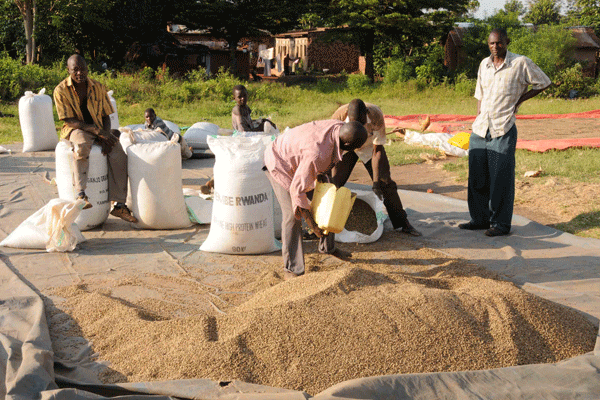Prime
Annual salt imports grow to Shs94.7billion

A salt miner picks salt stones from Lake Katwe in Kasese District. The salt is mainly mined by artisan miners. PHOTO BY FELIX BASIIME
Kampala- Uganda imported Shs94.7b ($25m) worth of salt for the year ended December 2019.
The Shs94.7b was part of about Shs479.6b ($126.6m) that was spent on importing mineral products such as salt, sulphur, earths and stones, plastering materials, lime and cement, according to a Finance Ministry report highlighting about 1,500 imports.
Uganda has one the biggest salt mining lakes - Katwe – in Kasese District west of Kampala.
However, the country continues to spend heavily on imports of edible salt, especially from Kenya.
However, there have been efforts to boost local production with the launch of a new salt production faculty - Kampala Salt - in Namagunga, Buikwe District.
While visiting the factory last week, Ms Evelyn Anite, the Finance state minister in charge Investment, said the factory would, on top of boosting local production and reducing the import bill, to reduce the price of salt on the market.
“We import finished salt worth $25m annually from EAC which can be reduced to about $12b,” she said, noting that Uganda would also seek to export some of the salt it is producing to Rwanda, South Sudan, DR Congo and Burundi.
Salt prices had during early March shown signs of volatility due to disruptions in the supply chain in Kenya, which had resulted from partial lockdowns to curb the spread of Covid-19.
Uganda’s salt imports have increased from Shs43b in 2010, according to the United Nations Commodity Trade Statistics Database.
About 90 per cent of the salt consumed in Uganda is imported, mainly from Kenya.
This has mainly resulted from the collapse of Lake Katwe Salt Factory for over three decades now with much of the salt at Lake Katwe mined by artisan miners.
The Kampala Salt factory, Ms Anite noted, is expected to improve household incomes through creating gainful employment, especially for women and the youth.
The factory has a production capacity of 30 tonnes per hour and over 192,000 tonnes of salt annually.
However, according to Ms Anite, it is currently producing salt for animal consumption with plans to start production of edible salt expected soon.
She also noted that other salt factories are expected to be set up with a number of engagements currently ongoing.
Mr Alok Kala, the Kampala Salt managing director, said the project has consumed about Shs15b with a current employment of 100 workers and is projected to grow to 500 when it starts producing at full capacity.
[email protected]




